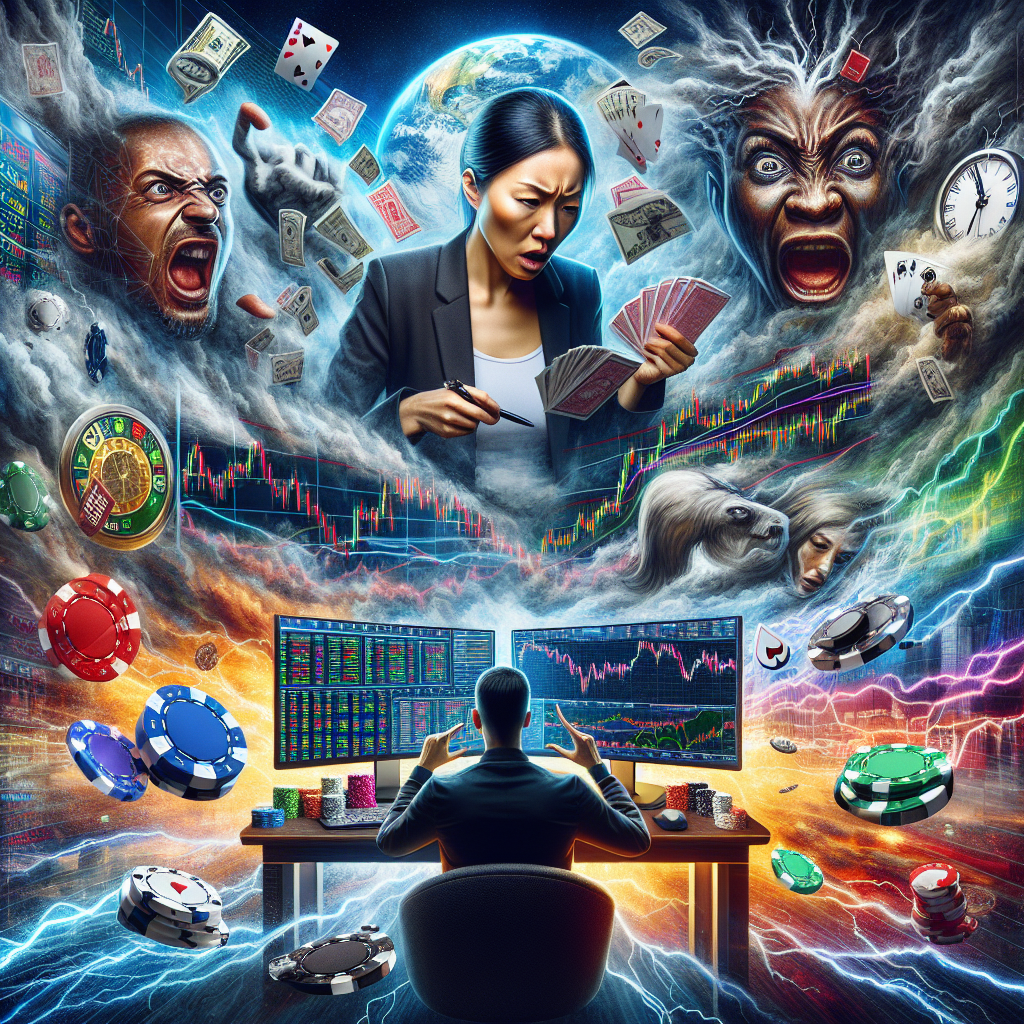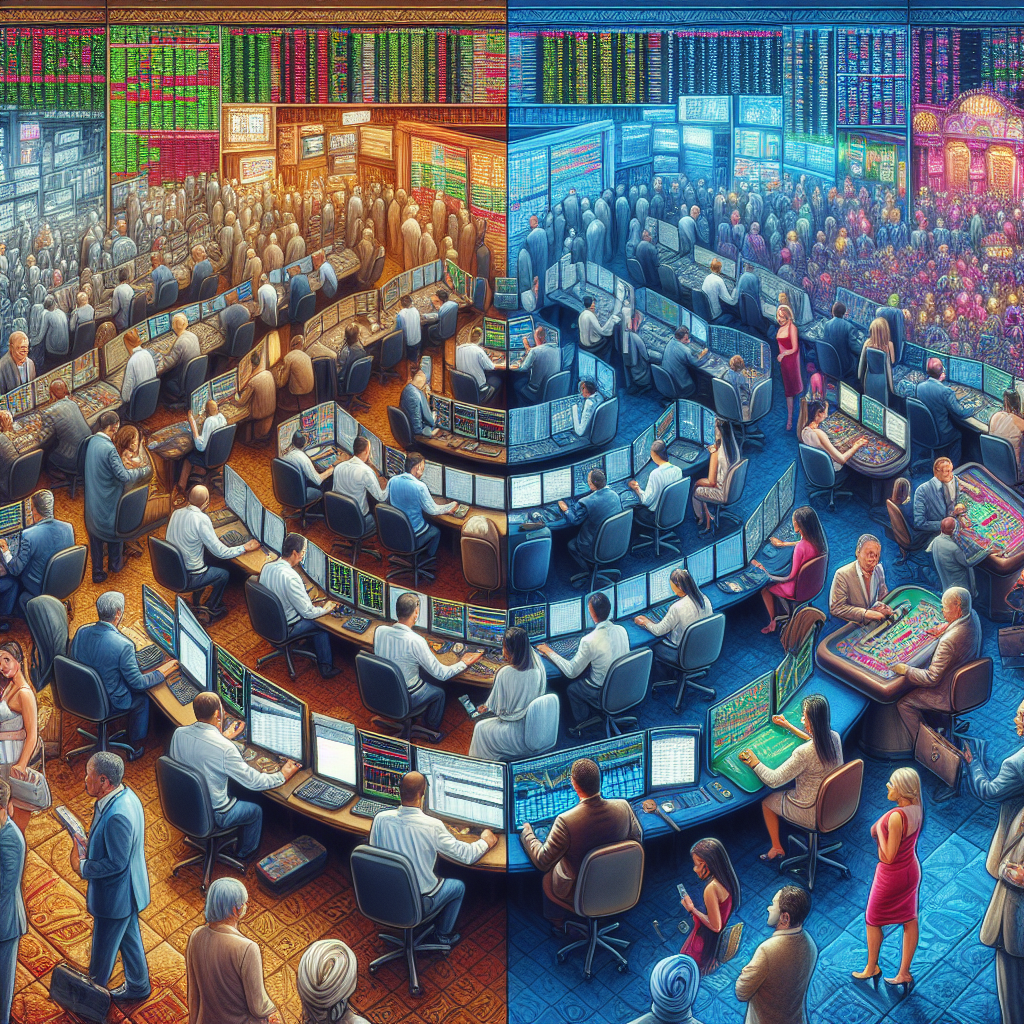Table of Contents
In the world of financial markets, the comparison between forex trading and gambling has long been debated. While both involve taking risks and the potential for gaining or losing substantial amounts of money, the underlying principles and strategies differ significantly. This article explores the similarities and differences between forex trading and gambling, shedding light on the factors that separate these two seemingly similar activities. Through an examination of key elements such as risk management, skill development, and market analysis, we aim to provide a comprehensive perspective on whether forex trading truly resembles gambling.

The Basics of Forex Trading
Introduction to Forex Trading
Forex trading refers to the buying and selling of currencies on the foreign exchange market. It is one of the largest and most liquid markets in the world, with trillions of dollars traded daily. The main participants in forex trading are banks, financial institutions, corporations, and individual traders like yourself.
How Forex Trading Works
In forex trading, currencies are always traded in pairs. The value of one currency is determined by its comparison to another currency in the pair. For example, if you believe the value of the euro will rise against the US dollar, you would buy the EUR/USD currency pair. If your prediction is correct and the euro does indeed increase in value, you can then sell the pair at a profit.
Forex trading operates on a decentralized market, meaning there is no physical exchange where trades take place. Instead, transactions are conducted electronically over-the-counter (OTC). This allows for 24-hour trading from Monday to Friday, as the market is open across different time zones.
The Basics of Gambling
Introduction to Gambling
Gambling, on the other hand, involves placing bets or wagers on uncertain outcomes with the hope of winning money or other valuable prizes. It is a form of entertainment and recreation that has been enjoyed by individuals for centuries. Unlike forex trading, gambling is typically centered around games of chance, such as casino games, lotteries, and sports betting.
Types of Gambling
There are various types of gambling, each with its own set of rules and characteristics. Casino gambling involves games like blackjack, roulette, and slot machines. Lotteries involve purchasing tickets and hoping to win a jackpot prize. Sports betting involves predicting the outcome of sporting events and placing bets accordingly. It’s important to note that while some forms of gambling may involve a certain degree of skill or strategy, luck still plays a significant role.
Probability and Chance in Gambling
Gambling is inherently a game of probability and chance. The outcome of any given bet or wager is determined by a combination of random factors. Probability theory is often used to calculate the likelihood of certain events occurring and to calculate the expected value of a bet. However, it is important to remember that probability does not guarantee a specific outcome, and even the most skilled gamblers can experience losses due to the inherent unpredictability of chance.

Risk and Reward
Understanding Risk in Forex Trading
Risk is an inherent aspect of forex trading. When you enter the forex market, there is always the potential for both gains and losses. Understanding and managing risk is crucial in order to protect your capital and achieve long-term profitability. Forex traders commonly employ various risk management techniques, such as setting stop-loss orders and implementing proper position sizing strategies.
Reward Potential in Forex Trading
Just as there is risk involved in forex trading, there is also the potential for substantial rewards. Successful traders are able to identify profitable opportunities and capitalize on them. By utilizing effective strategies, conducting thorough market analysis, and staying disciplined in their trading approach, traders can increase their chances of achieving consistent profits. It is important to note, however, that forex trading is not a guaranteed path to financial success and losses are always a possibility.
Psychological Factors
Emotions and Decision Making in Forex Trading
Psychology plays a significant role in forex trading, as it does in gambling. Emotional factors such as fear, greed, and impatience can greatly influence decision-making and trading outcomes. Fear of missing out (FOMO) can lead to impulsive trades, while greed can cause traders to hold on to losing positions for too long. Developing emotional intelligence and utilizing techniques such as maintaining a trading journal and practicing mindfulness can help traders overcome these psychological challenges.
Emotions and Decision Making in Gambling
Similar to forex trading, gambling also evokes strong emotions in individuals. The excitement of potential winnings or the disappointment of losing can lead to impulsive decision-making. This can result in chasing losses, placing larger bets to recover losses, or making irrational choices. Understanding and managing emotions is crucial in order to make rational decisions and maintain control over gambling activities.

Skill and Strategy
Technical and Fundamental Analysis in Forex Trading
Successful forex traders employ various analytical techniques to make informed trading decisions. Technical analysis involves studying price charts, analyzing patterns, and using indicators to identify potential market trends and reversals. Fundamental analysis, on the other hand, involves analyzing economic indicators, news events, and geopolitical factors that can impact currency values. By combining these approaches, traders can formulate effective trading strategies.
Strategy Development in Forex Trading
Developing a trading strategy is a fundamental aspect of forex trading. A well-defined strategy helps traders make consistent decisions based on predefined rules and criteria. Traders may choose to follow specific trading systems or develop their own strategies based on their individual preferences and risk tolerance. Backtesting and forward testing strategies can help traders assess the effectiveness of their chosen approach and make necessary adjustments.
Skills Required for Successful Forex Trading
Achieving success in forex trading requires a combination of technical skills, market knowledge, and psychological discipline. Traders need to have a strong understanding of market trends, economic indicators, and currency correlations. Additionally, they must possess analytical skills to interpret and make sense of the vast amount of market data.
Strategy Development in Gambling
While some forms of gambling, such as poker or sports betting, may involve a certain degree of skill and strategy, many other forms, such as slot machines or roulette, are purely games of chance. In games of skill, developing a strategy can help increase the chances of winning, but luck still plays a role. It is important for gamblers to understand the game they are participating in and to never rely solely on the element of luck.
Regulation and Oversight
Regulatory Bodies in Forex Trading
Forex trading is regulated by various regulatory bodies around the world to ensure fairness, transparency, and investor protection. Depending on the jurisdiction, these regulatory bodies may include entities such as the Securities and Exchange Commission (SEC) in the United States, the Financial Conduct Authority (FCA) in the United Kingdom, or the Australian Securities and Investments Commission (ASIC). Traders should ensure that they trade with regulated brokers to mitigate the risk of fraud or malpractice.
Regulation of Gambling
Gambling is subject to regulation in many countries to prevent illegal activities and protect consumers. Regulatory bodies oversee various aspects of the gambling industry, such as licensing and monitoring of operators, ensuring responsible gambling practices, and enforcing anti-money laundering regulations. These regulatory measures aim to create a safe and secure environment for gamblers, although the level of regulation may vary across jurisdictions.

Long-term vs Short-term
Investing vs Gambling Mentality
When it comes to forex trading, adopting an investing mentality rather than a gambling mentality can make a significant difference in long-term success. Investing involves careful analysis, risk management, and a focus on long-term goals. In contrast, a gambling mentality may involve impulsive decision-making, excessive risk-taking, and a focus on short-term gains.
Long-term Investing in Forex Trading
Long-term investing in forex trading typically involves holding positions for days, weeks, or even months. Traders who adopt this approach often rely on fundamental analysis and follow macroeconomic trends. They aim to capture larger market movements and profit from long-term trends. This strategy requires patience, discipline, and the ability to ride out short-term fluctuations.
Short-term Trading and Gambling
Short-term trading in forex, also known as day trading or scalping, involves opening and closing positions within a short time frame, often within minutes or hours. This approach requires a focus on technical analysis and utilizing strategies that capitalize on smaller price movements. While short-term trading can be profitable, it also carries higher risks and requires constant monitoring of the market.
Leverage and Margin
Understanding Leverage in Forex Trading
Leverage is a powerful tool that allows traders to control larger positions with a smaller amount of capital. It magnifies both potential profits and losses. For example, with a leverage ratio of 1:100, you can control a position worth $100,000 with just $1,000 of your own capital. While leverage can amplify gains, it also exposes traders to higher levels of risk.
Margin Trading in Forex
Margin trading allows traders to enter positions larger than their account balance. By depositing a certain percentage of the position’s value as margin, traders can access higher leverage and take on larger trades. However, it is important to carefully manage margin requirements and be aware of the potential for margin calls, where additional funds may be required to maintain positions.
Leverage and Margin in Gambling
In gambling, leverage and margin are not applicable concepts. Unlike forex trading, where leverage allows traders to increase their exposure to the market, gambling is generally limited to the amount of money one is willing to wager. The outcome of a bet in gambling is not influenced by leverage or margin, but rather by the odds or probabilities associated with the game being played.

Education and Knowledge
Importance of Education in Forex Trading
Education is essential for success in forex trading. It provides traders with the knowledge and skills needed to navigate the complex and dynamic world of the financial markets. Understanding fundamental concepts, technical analysis tools, risk management techniques, and trading psychology empowers traders to make informed decisions and ultimately improve their trading performance.
Training and Practice in Forex Trading
Practicing and honing your skills through demo accounts, trading simulators, and backtesting are crucial steps in your forex trading journey. These tools allow you to develop and test your strategies without risking real money. By gaining experience in a risk-free environment, you can refine your approach and build confidence before transitioning to live trading.
Education and Knowledge in Gambling
While gambling may not require formal education in the same way as forex trading, acquiring knowledge about the specific game or activity you are participating in can increase your chances of success. Understanding the rules, odds, and probabilities associated with the game can help you make more informed decisions and improve your overall outcomes. Many professional gamblers dedicate time to study and gain insights into the games they play.
Conclusion
Final Thoughts on Forex Trading and Gambling
While both forex trading and gambling involve financial risk and potential rewards, there are fundamental differences between the two. Forex trading is based on the principles of supply and demand, economic indicators, and market trends, allowing traders to utilize various strategies and tools to increase their chances of success. In contrast, gambling relies heavily on chance and luck, although some forms of gambling may involve skilled decision-making and strategy.
Deciding Factors: Skill or Luck?
When it comes to determining the deciding factors between skill and luck in forex trading and gambling, it is important to recognize that both elements coexist to varying degrees. Success in forex trading requires a combination of technical skills, market knowledge, disciplined decision-making, and emotional control. While luck can play a role, it is skill and strategy that ultimately determine long-term profitability.
In gambling, luck often plays a more significant role, especially in games of pure chance. However, in games of skill, such as poker or sports betting, skillful decision-making can tip the odds in your favor. Understanding the specific game being played and employing effective strategies can increase the likelihood of favorable outcomes.
Ultimately, whether you choose forex trading or gambling as your preferred financial activity, it is important to approach it with the necessary knowledge, skills, and risk management techniques. By doing so, you can enhance your chances of achieving your financial goals while minimizing potential losses.



